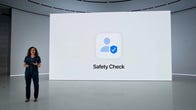This story is part of WWDC 2022, CNET’s complete coverage from and about Apple’s annual developers conference.
Apple on Monday announced a new Safety Check feature for iOS, aimed at people who are planning to leave an abusive relationship. The feature lets users review and reset who has access to location information as well as passwords, messages and other apps on an iPhone.
Apple debuted the feature at its annual WWDC event. Safety Check is a response to the fact that phones can become a liability when people try to leave abusers, a time that domestic violence experts say is the most dangerous point in an abusive relationship. Features that can be convenient in a family or relationship can also give abusers dangerous information.
“Many people share passwords and access to their devices with a partner,” said Katie Skinner, a privacy engineering manager at Apple, at the event Monday. “However, in abusive relationships this can threaten personal safety and make it harder for victims to get help.”
In addition to turning off location sharing, the feature resets your privacy permissions on apps and protects access to your messages, limiting iMessage and FaceTime sessions to your device only. It also prompts you to reset your Apple ID password, which would revoke anyone else’s access to your iCloud account and any sensitive data stored there. It also lets you review your emergency contacts.
Apple worked with domestic violence prevention agencies to develop the feature, including the National Network to End Domestic Violence and the National Center for Victims of Crime.
“In times of crisis, for many survivors, it’s important to know who has their location and information,” the National Center for Victims of Crime said in a statement shared by Apple. “Safety Check helps give control back to survivors.”
Safety Check works to remove access that you’ve intentionally granted to a partner or family member. Resetting the Apple ID password would also likely disable any software an abusive partner has added without your knowledge. Known as stalkerware, the software is designed to intercept location information, messages and even web searches, but it typically only works on iPhones if the abuser has the target’s iCloud password.
Read more: Stalkerware: What to Do if You’re the Target.
Apple has faced criticism for the impact its technology can have on domestic abuse survivors. Advocates flagged its AirTag as a potential stalking tool, given that the small, easy-to-hide device provides location tracking. Apple responded by creating an AirTag and Find My app that lets Android users detect nearby AirTags, and then adding privacy warnings, adjusting sound alerts and attaching tracking codes to the devices.

